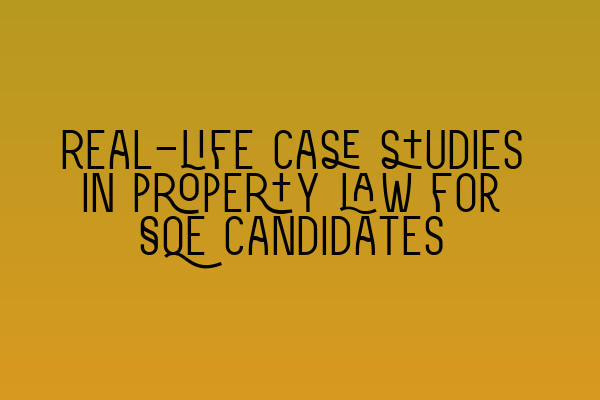Real-life Case Studies in Property Law for SQE Candidates
As an aspiring solicitor, studying property law is an essential part of your journey towards becoming a qualified professional. Understanding the intricacies of property law is crucial in providing expert advice to clients and ensuring legal compliance in various real estate transactions.
In this blog post, we will explore some real-life case studies in property law that will help you better grasp the practical application of the concepts covered in the Solicitors Qualifying Examination (SQE). By delving into these examples, you can develop a deeper understanding of property law and enhance your chances of success in the SQE exams.
Case Study 1: Residential Leasehold Extension
Imagine you are representing a client who owns a leasehold property and wants to extend their lease. The client is concerned about the implications of the lease term nearing its expiration and wishes to explore their rights and options. As their solicitor, you need to guide them through the process of extending their lease, ensuring compliance with all legal requirements.
This case study highlights the importance of understanding the Leasehold Reform, Housing and Urban Development Act 1993 and other relevant legislation in leasehold extensions. By analyzing the legal framework and applying it to your client’s situation, you can outline the necessary steps, negotiate with the landlord, and secure a favorable lease extension for your client.
For a more comprehensive understanding of leasehold extensions and other related topics, check out our SQE 1 Practice Exam Questions and SQE 1 Practice Mocks FLK1 FLK2 articles.
Case Study 2: Adverse Possession
Adverse possession can be a complex and contentious area of property law. In this case study, imagine you are representing a client who has been in continuous possession of a piece of land for over 20 years, believing it to be theirs. However, they recently discovered that the land is actually owned by someone else who intends to reclaim it.
Your role as the solicitor is to assess the client’s claim to adverse possession and advise them on their rights and options. You will need to investigate the factual circumstances, gather evidence of continuous possession, analyze the legal requirements for adverse possession, and determine the likelihood of success in defending their claim.
For additional resources to enhance your knowledge of adverse possession and related topics, explore our SQE 2 Preparation Courses and SQE 1 Preparation Courses articles.
Case Study 3: Restrictive Covenants
Restrictive covenants are provisions in property deeds that impose certain restrictions on the use of land. In this case study, you are representing a developer who wishes to build a new residential complex on a piece of land. However, they have discovered restrictive covenants that may hinder their plans.
Your task as the solicitor is to analyze the restrictive covenants, identify their scope and applicability, and advise your client on potential options. This may involve negotiating with adjacent landowners, seeking court modifications or releases of the restrictive covenants, or exploring alternative plans that comply with the existing restrictions.
To further enhance your understanding of restrictive covenants and related topics, take a look at our article on SRA SQE Exam Dates.
Conclusion
These real-life case studies in property law provide valuable insights into the practical application of the concepts tested in the SQE exams. By studying and analyzing these scenarios, you can develop a deeper understanding of property law and improve your chances of success in the solicitor qualification process.
For additional resources, such as practice exam questions and preparation courses, be sure to check out the relevant articles linked throughout this post. Building a strong foundation in property law is vital for your success as a solicitor, and these resources will support your journey towards becoming a qualified professional.
Remember, property law is a dynamic field, and staying up-to-date with changes in legislation and recent case law is essential. So, continue to explore, learn, and apply your knowledge to practical scenarios to excel in property law and land law.
